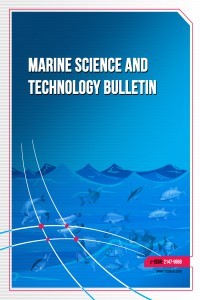
Marine Science and Technology Bulletin
Yazarlar: Semih KALE, Tuba EJDER, Olcay HİSAR, Fatih MUTLU
Konular:Deniz ve Tatlı Su Biyolojisi, Mühendislik, Ortak Disiplinler
DOI:10.33714/masteb.285988
Anahtar Kelimeler:Climate change,Global warming,Streamflow,Trend analysis,Pettitt Chang point analysis
Özet: The main objective of this study was to estimate the potential impacts of climate change due to the global warming on streamflow of Karamenderes River (Çanakkale, Turkey). A 36-years dataset belongs to the streamflow of Karamenderes River and a 43-years dataset belongs to the climatic parameters (temperature, precipitation, and evaporation) obtained from Çanakkale, Bozcaada, Gökçeada meteorological stations in Çanakkale. Time series analysis was applied to the streamflow and climatic parameters. Pettitt change point analysis was performed to detect the change time and trend analysis was applied for estimating the trends. Kendall’s tau and Spearman’s rho correlation tests were applied to find out the relationship between streamflow and the climatic parameters. Pettitt change point analysis results indicated that the change year for streamflow was 1982. Trend analysis results showed that there were decreasing trends in the streamflow and precipitation, and increasing trends in temperature and evaporation. Correlation tests results pointed out that these changes were statistically insignificant. Increasing temperature and decreasing rainfall due to the climate change caused a decrease in the streamflow of the river. In conclusion, the climate change impacts on streamflow could be variable. Also, anthropogenic effects and agricultural activities may affect the responses of the rivers to the global warming and climate change impacts. It is suggested that dam building on the rivers might be beneficial to provide more water for irrigation or other purposes in sustainable way.